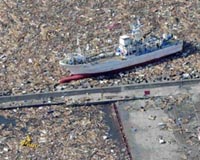| . |  |
. |
Tokyo (AFP) March 16, 2011 The mayor of a town near Japan's quake-damaged and stricken Fukushima nuclear plant said Wednesday that it desperately needs help for thousands of evacuees sheltered there. "We have received many people who were evacuated from the area near the plant," Masao Hara, mayor of Koriyama city, about 50 kilometres (30 miles) east of the nuclear plant, told AFP by mobile telephone. "Right now some 9,000 people are at shelters in Koriyama," he told AFP, including 200 at a baseball stadium which was recently renovated to receive disaster evacuees. "What we urgently need now is fuel, heavy and light oil, water and food. More than anything else, we need fuel because we can't do anything without it. We can't stay warm or work the water pumps. "We also need to move our vehicles to collect garbage. I really would like to appeal to the world: We need help." More than 200,000 people have been evacuated from a 20 kilometre radius around the power station, which has been rocked by a series of explosions and seen local spikes of radiation at levels damaging to human health. "People are worried but acting very calmly," said Hara. "They're not in a panic at all. They get more concerned after they watch television and see how anxious the rest of the country is." The Fukushima plant was damaged in Friday's massive quake and tsunami calamity, which killed thousands and left large parts of northern Japan desperately short of water, food, fuel and other basic necessities.
earlier related report The state-run China National Radio also reported that two ships able to transport a total of 4,000 people were on standby in the eastern city of Yantai and planned to sail on Wednesday to bring back Chinese citizens. Beijing has begun helping its nationals leave disaster-hit areas in Japan, where a 9.0-magnitude quake and ensuing tsunami have left more than 10,000 dead or missing and triggered a crisis at a nuclear plant. China Southern said it had added one flight each to the Japanese capital Tokyo and to Niigata on the country's west coast "to bring back affected nationals." China Eastern, another state-owned airline, said it had added one flight to Japan, while flag carrier Air China said it was replacing some of its planes servicing Japanese routes with bigger models to accommodate demand. Air China has cancelled several of its daily flights to and from Japan since the disaster struck on Friday, citing safety fears at Japanese airports. A Chinese media report earlier said there were about 33,000 Chinese nationals living in five disaster-hit Japanese prefectures.
earlier related report Asked if Japan is ready to seek assistance from the US military at the stricken Fukushima plant, Chief Cabinet Secretary Yukio Edano said: "US military cooperation is needed when necessary. They have already cooperated in providing logistic materials." He added: "We are preparing ourselves" to arrange further cooperation.
earlier related report Border inspection authorities in Shanghai released a statement Wednesday saying they were checking all incoming travellers, luggage, and imports of food and other goods from Japan that enter the city's airport or port. The nation's product safety agency issued a notice late Tuesday ordering authorities involved in inspection of incoming goods nationwide to "strengthen their analysis of the risk of radioactive material entering the country". The General Administration of Quality Supervision, Inspection and Quarantine added that inspectors must "effectively perform the job of monitoring atomic and radioactive matter at ports". The Fukushima nuclear facility on Japan's east coast has been hit by a series of explosions and fires since Friday's 9.0-magnitude quake and ensuing tsunami cut power to the plant and caused reactor fuel rods to heat up dangerously. A fresh fire broke out at the plant early Wednesday, compounding the crisis. It was said to have been extinguished but a cloud of white smoke was later seen rising above the plant, the cause of which was not immediately known. On Tuesday, radiation levels around the plant rose to dangerous levels before authorities said they later fell, but the situation has prompted concern in Japan and its neighbouring countries. China's ministry of environmental protection has said it so far has not detected any abnormal radiation levels. Weather authorities say radioactive particles from the plant should have no impact on the country over at least the next two days. China has offered help in evacuating its citizens from disaster-hit areas in Japan, where more than 10,000 people are dead or missing. Border inspection officials in Beijing said they were continuing to monitor incoming passengers at airports for radiation levels, but added this was routine even before Japan's disasters and they had not stepped up vigilance.
Share This Article With Planet Earth
Related Links Bringing Order To A World Of Disasters When the Earth Quakes A world of storm and tempest
 Unique Japan tsunami footage boon to scientists
Unique Japan tsunami footage boon to scientistsSydney (AFP) March 16, 2011 Vision of the disastrous tsunami rolling onto Japan after last week's massive 9.0-magnitude earthquake will provide valuable data to scientists for years to come, Australian experts said Wednesday. Compelling images of the monster wave crashing onto low-lying farmland in Japan's northeast, sweeping all in its path into a surging waterway, was played live by television stations as helicopter- ... read more |
|
| The content herein, unless otherwise known to be public domain, are Copyright 1995-2010 - SpaceDaily. AFP and UPI Wire Stories are copyright Agence France-Presse and United Press International. ESA Portal Reports are copyright European Space Agency. All NASA sourced material is public domain. Additional copyrights may apply in whole or part to other bona fide parties. Advertising does not imply endorsement,agreement or approval of any opinions, statements or information provided by SpaceDaily on any Web page published or hosted by SpaceDaily. Privacy Statement |